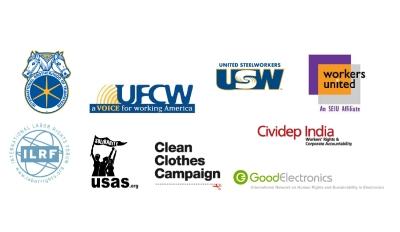
Publication Date:
Claudia Coenjaerts
President / CEO
Fair Labor Association
1111 19th Street NW, Suite 401
Washington, DC 20036
Dear Ms. Coenjaerts,
As national and international trade unions and nongovernmental organizations, we are writing in response to the Fair Labor Association’s request for input concerning the FLA’s “Organizational strategy on wages,” that was shared with some of us in December 2014 and FLA’s “Draft Fair Compensation Workplan.”
Overall, the wage strategy that FLA has circulated is exceedingly long on plans to study what constitutes adequate wages, but notably short on what FLA member companies will actually be obligated to do to raise wages in their supply chains.
While the FLA’s proposed wage strategy is presented as a mechanism for implementing a recently added provision in the FLA Workplace Code of Conduct -- that member companies make progress toward adequate wages for workers -- it lacks the urgency commensurate with the global crisis of poverty wages, and associated severe labor rights and safety violations, in the supply chains of FLA member companies. FLA member companies will have to submit a “specific, measurable, and time-bound plan for fair compensation of workers in the supply chain,” but they are not required to begin implementing the plans until FLA’s February 2018 board meeting, three years from now. FLA will not set timelines and specific goals for its affiliates until June 2017, and they do not state whether or not those goals will address any minimum rate of increase or a minimum proportion of workers who must benefit. Furthermore, any enforcement action to hold affiliates to those goals and timelines is undefined; there is a mention of possible FLA sanctions, but that is no guarantee companies can be held to their commitment. In the first phase, after the companies have implemented the plans, accountability consists of “support, learning and improvement.” In the second phase, only companies that fail to craft realistic plans or “repeatedly fail to meet goals” will be “recommended for review.” As a result, four years or more would pass before the FLA holds any company accountable by reviewing its membership status; furthermore, the FLA has never revoked a company’s membership for non-compliance with the FLA Workplace Code of Conduct.
Weak enforcement action in the distant future for unspecified goals is a wholly inadequate strategy to address the crisis of poverty wages and urgent need to improve workers’ lives.
FLA’s lack of urgency in addressing the crisis of poverty wages is all the more notable in that FLA itself recognizes that a number of companies already have made “specific and time-bound commitments to ensure fair compensation for some or all of its workers,” and that presumably they understand how to raise wages without extensive studies on the subject.
Furthermore, FLA’s strategy of extensive “learning and planning” before “making change,” explained in its January 2015 “Draft Fair Compensation Workplan,” also appears to contradict the general strategy of using “the pressure of higher wage levels to drive innovation in pricing, production methods, industrial relations, and worker retention, for example” as stated in its October 2014 Wage Strategy and restated in the January 2015 “Draft Fair Compensation Workplan.” “Meaningful and measurable progress cannot be made to wait on those factors,” the FLA stated just three months earlier. Yet waiting is exactly what the FLA proposes to do in the Workplan. The “learning and planning” phase, scheduled for March 2015 to June 2017, will consist of “intensive research and training” to help affiliates “figure out how to address” larger issues that affect compensation, namely, “minimum wage setting, industrial relations, greater productivity, and purchasing practices” before they even begin to implement plans toward living wages. Also concerning here is the approach to research and training, which calls for input from trade unions and labor rights NGOs to FLA, but does not propose a more robust role for these groups in decision making, such as might be had through a negotiation between equals.
In fact, determining whether a company is serious about ensuring living wages in its supply chain is not a complicated matter. Any strategy that would do so must start with positive responses to the following questions:
- Does the company actually require its suppliers to pay workers a living wage?
- Does the company itself pay enough to its suppliers (in both order volume and per unit prices) to make it feasible for those suppliers to sustainably pay workers a living wage?
- Does the company ensure that its suppliers respect workers’ rights to organize and bargain collectively so that these workers can secure an adequate share of what the company pays suppliers?
- Is the company transparent with respect to its supply chain ― the names and locations of the factories where its products are made ― and does it permit independent verification of wage levels?
Any wage strategy that does not require companies to make and fulfill these basic commitments cannot be taken seriously. Unfortunately, we do not see any of these requirements in FLA’s proposed strategy. FLA does not yet require member companies to ensure a living wage is paid in their operations and supply chains, and the other elements remain undefined. It also does not set credible wage benchmarks that companies need to meet in a timebound fashion. Goals and timelines appear up for negotiation within individual companies or between the companies and the FLA. Enforcement mechanisms are non-existent. Purchasing practices remain a study topic. We do not know if or how the FLA can hold its member companies accountable for violations of workers’ right to organize, and the role of freedom of association and collective bargaining in the wage setting process is left in the “leaning and planning” phase. Finally, FLA does not and has not announced any plans to require member companies to publicly disclose the names and addresses of the factories where their products are made.
Today, across countries and economic sectors, the issue of living wages for workers in the global supply chains and workforces of multinational corporations is on the public agenda like never before. Workers at individual workplaces and whole industries are calling for concrete and binding action that improves their lives― from fast food workers demanding a higher starting wage to tomato pickers calling for a higher piece rate.
Similarly in the garment industry, in which most FLA member companies operate and poverty wages remain pervasive, the chief obstacles to living wages are those of cash and commitment, not computation. In fact, the FLA member Knights Apparel has shown, through its partnership with the trade union at the Alta Gracia factory in the Dominican Republic, that payment of living wages can be achieved when workers are empowered to bargain and buyers are willing to cease demanding the lowest price. Previously, such three-way binding commitments were a key mechanism through which living wages were achieved and sweatshop conditions largely eradicated in the supply chains of some of the FLA’s own founding companies in the United States, until the industry shifted its supplier base to locations where both independent unions and wages for garment workers have been deliberately suppressed.
We are encouraged that the FLA and its member companies are interested in dialogue with labor on the issue of living wages for workers in their supply chains. It was the refusal by FLA member companies to make any commitment with respect to wages – other than payment of the legal minimum ― that led unions and other worker rights advocates to part ways with the FLA fifteen years ago. At the time, the only measure in this regard that the FLA’s member companies would accept, worker representatives were told, was a “study” to examine the adequacy of existing wages. Unfortunately, more than a decade later, the FLA’s proposed strategy does not require companies to ensure that workers actually receive a living wage; instead it outlines continued studies.
The workers in FLA member companies’ supply chains, many of whom live in poverty, cannot afford to wait while the FLA continues to “study” what these workers already know: that the wages they receive do not come close to permitting them and their families a decent and humane daily existence. And they cannot rely on “plans” put forward by companies that have made no binding commitments to paying living wages in their supply chains, with no accountability for ensuring that these plans will have any meaningful impact on workers’ lives.
We urge the FLA to demonstrate a fundamentally different approach now, one that reflects the lessons learned and places a living wage strategy within a more robust approach to ensuring core labor standards in member companies’ operations and supply chains. You rightly note that wages are not set in a vacuum; yet urging productivity gains as a means to raising wages, as the work plan document suggests, creates enormous risks for workers when they have no access to independent union representation. We urge you to embed living wage strategy in a framework that overcomes the design flaws of voluntary, confidential monitoring programs that have failed to ensure a meaningful role for trade unions.
We therefore ask the FLA to revise its living wage strategy to focus on member company commitments to pay living wages, according to a credible benchmark, throughout their operations and supply chains. To this end, the FLA should require its member companies to structure their business relationships with suppliers, both in terms of price and volume, in such a way that living wages can feasibly be paid. The FLA also should require these firms to ensure that workers in their own operations and suppliers’ facilities have the rights and freedom to organize and bargain over wages. It should require FLA members to disclose the factories in their supply chains, in order to enable transparency concerning whether these commitments are being met. And, most importantly, the FLA should require its member companies to ensure that workers throughout their supply chains are paid a living wage and adopt strict accountability measures to enforce this requirement.
When the FLA is ready to require such fundamental commitments by its member companies with respect to living wages in their supply chains, then we, as worker representatives and advocates, stand ready to work in partnership with them to see such commitments fulfilled. Until that time, however, we must note that, despite the FLA’s new interest in dialogue on this issue, we are disappointed by FLA member companies’ lack of commitment to living wages and the FLA’s proposed strategy.
Sincerely,
Cividep
Clean Clothes Campaign
GoodElectronics Network
International Brotherhood of Teamsters
International Labor Rights Forum
United Food and Commercial Workers International Union
United Steelworkers
United Students Against Sweatshops
Workers United- SEIU

